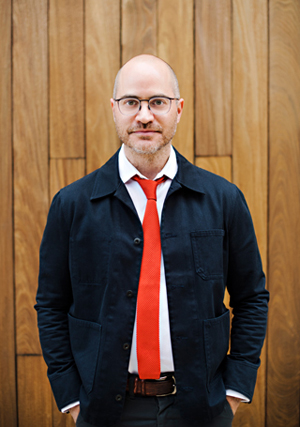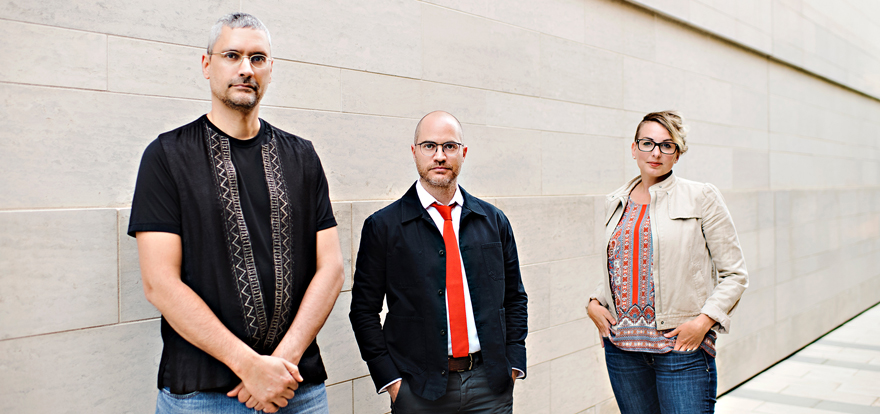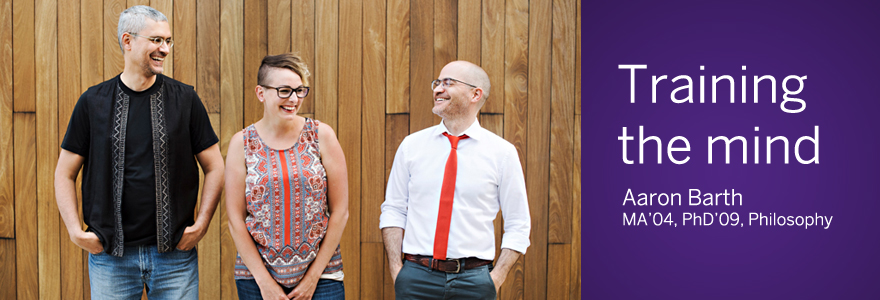Training the Mind
Alumnus solving business problems by combining brain science and the creative arts
By: Rachael Courtemanche, BA ‘16
Dialectic: The art of investigating the truth of ones options; a form of intellectual discovery. That’s what makes Aaron Barth, M.A., Ph.D., in Philosophy from Western University, and his business, Dialectic, so unique. Unlike traditional business consulting and training companies, Barth’s small but mighty team design thinking and skills based programs that make businesses and their employees smarter and better at what they do every day.
 "I am really indebted to the philosophy department at Western. They gave grad students a chance to be instructors. Not just teaching assistants (TAs), but we got to instruct and I realized I really love being up in front of a class teaching."
"I am really indebted to the philosophy department at Western. They gave grad students a chance to be instructors. Not just teaching assistants (TAs), but we got to instruct and I realized I really love being up in front of a class teaching."Barth’s journey to starting his own business began with Philosophy courses. Barth discovered his passion for philosophy and teaching while exploring his lifelong love of mathematics at Queen’s University in 1998. While there, Barth took an elective course in philosophy, and it was at that time he realized he needed to dive deeper. After a colleague referred Barth to Western’s Philosophy department, he shifted his academic focus towards getting his Masters and PhD in philosophy at Western University. It was during his time here at Western from 2003 to 2008 that Barth had the opportunity to teach, and fall in love with teaching, philosophy.
“I am really indebted to the philosophy department at Western. They gave grad students a chance to be instructors. Not just teaching assistants (TAs), but we got to instruct and I realized I really love being up in front of a class teaching,” Barth said in an interview with Troy Bridgeman, journalist at Guelph Mercury.
Instead of choosing an academic environment, Barth chose businesses as his classroom. “It was really a passion for thinking, design, and crafting learning experiences that made me want to start my own business, and doing it from a place using rigorous, reliable, and authentic data” Barth commented.
Barth established Dialectic in 2010 in Guelph, Ontario. While he didn’t necessarily have a challenge getting clients at first, Barth mentioned it’s always difficult getting a business off the ground. Teaching critical thinking to working adults required a different approach than it did for students – it had to be more interactive and relatable. Starting with a basic business model – designing a program and re-marketing it – Barth found that approach worked well for his clients that he knew through colleagues and referrals. However, after a year into operating Dialectic, Barth made a shift.
“I knew I could make my programs more effective if I met the audiences and users of my programs beforehand to learn the issues they may be having, and how the skills I intended to teach might help them. This new component of discovery is now core to what we do,” Barth said. “Once I made that shift to extensive discovery and tailored design, the results of the interventions started improving and we started getting more calls from people I didn’t know.”
Dialectic now gathers discovery information using deep, applied scientific methods and research, and engages a diverse range of professionals in developing their solutions – from social psychologists, cognitive scientists, and philosophers, to graphic artists, instructional designers, and creative media developers – with about half of their core peers and networks having philosophy backgrounds.
One of the many things that makes Dialectic so different is how they define themselves: as an innovation design company. They focus on designing experiences that change the way people think and act – placing less emphasis on product and brand solutions to improve workplace performance, and more on behavioural, human, and emotional innovation. Rather than a one-size-fits-all, temporary solution, Dialectic partners with organizations to solve business problems by combining brain science and the creative arts.
Creative Investigation

So how is it done? “We come at it from ‘how are people thinking and feeling’ – and really try to create emotional and rational engagement in the experiences we craft” said Barth. These experiences respond to the client’s challenges and range from in-person training events, to eLearning, multi-media experiences and large-scale programs that improve business performance.
“We try to find out what the core of the problem is and try to actually solve it – which is rare in traditional business consulting,” said Neil LaChapelle, Creative Director at Dialectic, who also has a philosophy background. “In the dialogue we have with our clients, we go into the situation with a client, look at the presenting problem, and show them opportunities they didn’t realize they had – we elevate the conversation so they can achieve more.”
The Dialectic team work with their clients in exploring deeper analysis of their problems, and in developing meaningful, creative solutions. Often, the first step towards this is greater self-awareness, allowing individuals to discover (and challenge) ignorance and biases. It’s about embracing that ‘slow thinking’ and reflection, instead of jumping to what we think the correct answer or solution is – advice grounded in critical thinking that is as relevant to first year Philosophy as to the C-suite.
“Philosophy teaches you how to reason about anything” said Barth. “When people ask you what you are going to do with your philosophy degree, your response should be anything – you’re literally able to think about everything in a way that’s helpful to people around you.”
Looking Back and Ahead
Even almost 10 years after studying at Western, philosophy remains a steady force in Barth’s everyday life. It’s a part of his community, the organizations he works with, and his relationships. Philosophy equipped him with a breadth of skills and knowledge that are increasingly being recognized as important skills within and outside of the workforce.
“Philosophy teaches you how to reason about anything” said Barth. “When people ask you what you are going to do with your philosophy degree, your response should be anything – you’re literally able to think about everything in a way that’s helpful to people around you.”
Cindy Holland, Dialectic’s Interactive Media Designer, spoke highly of Barth and LaChapelle’s natural ability to form deep and meaningful client relationships, citing her colleagues as mentors that have taught her so much about philosophy and intellectual investigation. In turn, Holland’s creative talent brings their solutions from idea to completion, producing the items Dialectic’s clients are learning from.
As an entrepreneur, Barth has been driven by his passions and a desire to help others think better. Barth and his team have the rare ability to make ancient philosophers seem breathtakingly relevant to modern working conditions. They set a clear example of how invaluable philosophy has been in starting, guiding, and driving Dialectic forward.
 About our Contributor
About our Contributor
Rachael Courtemanche, (BA'16), graduated from Western University in 2016 with an Honors Specialization in English Language and Literature and Creative Writing. Rachael has been working as Communications Coordinator at the London Economic Development Corporation (LEDC) since June 2015, creating content for the LEDC’s website and social media channels, as well as developing and monitoring various communications and marketing strategies.







